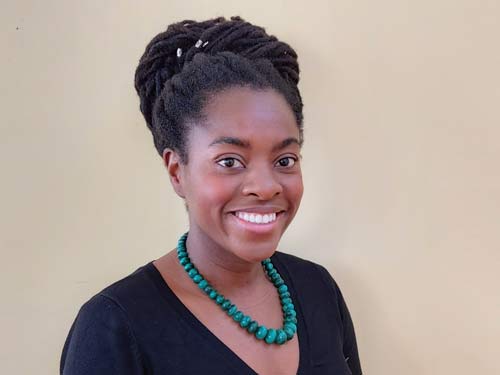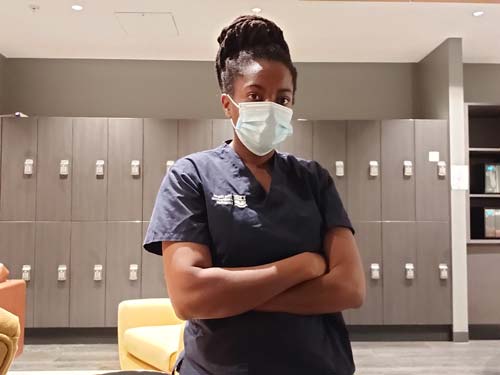Kudzai Kanhutu: Infectious diseases expert
Dr Kudzai Kanhutu is an infectious diseases specialist at Royal Melbourne Hospital. The 2019 Superstar of STEM recently spoke to us about the importance of varied experience for healthcare workers and not letting “ingrained lowballing” get in her way.
“Interdisciplinarity is everything”
 Kudzai’s pathway into medicine wasn’t exactly linear.
Kudzai’s pathway into medicine wasn’t exactly linear.
Having completed a double degree in Arts and Science at the University of Melbourne, Kudzai headed to Sydney University to complete her medicine degree, before returning to Melbourne to undertake the Master of Public Health. Now she’s looking forward to commencing an Executive Master’s in Business.
According to Kudzai, her “unorthodox entryway” into medicine was key to being able to address the needs of her patients in a clinical setting.
“Interdisciplinarity is everything. I can't stress it enough,” Kudzai shares. “It allows you to bring different ways of thinking to new challenges, and every day with a patient is a new challenge.”
In a field where choosing a narrow specialization early on is increasingly the norm, Kudzai would love to see more medical professionals pursuing varied experiences.
“To have that ability to communicate health concepts in a way that is not health centric or where the origin of that thought is not actually a scientific one is so invaluable,” Kudzai shares. “Every now and then you meet a patient where you think, ‘Where are we going to gel here? What is the mutual point of conversation that we're going to have?’ Having done a lot of other stuff makes life so much easier. It's another language that you can refer to.”
What does it take to be an infectious diseases physician?
 “What it means is that you are somebody who likes to learn and never gets tired of learning new things. It usually means you're somebody who's insatiably curious and likes to get in people's business,” Kudzai shares.
“What it means is that you are somebody who likes to learn and never gets tired of learning new things. It usually means you're somebody who's insatiably curious and likes to get in people's business,” Kudzai shares.
“If you are an infectious diseases physician, it means you can ask people all sorts of things that maybe other specialties are fearful of asking, because you have to be intensely curious about people to get to the bottom of an infection or understand why someone might have an infection based on where they've traveled, based on who they've slept with recently, all manner of things.”
Being an infectious diseases expert during the COVID-19 pandemic has obviously added complexity to Kudzai’s already busy schedule. Fortuitously, she had the foresight to begin setting up a telehealth service at the hospital back in 2016.
“At the time I remember saying one of the business cases was that if we ever had an outbreak, we'd be able to avoid people coming into the hospital and everybody kind of being like, ‘Yeah, maybe.’ Now I'm like, ‘I told you!’ It's nice that we're semi-ready.”
“Just do it”
For others wanting to succeed in the health field, Kudzai has some advice.
“If I could Nike it up, ‘Just do it’,” Kudzai urges. “Recently I started doing weight lifting, and learned that everything can be improved upon. If you decide what your goal is and you get the right team around you, you can get to where you're going.
You don't have to turn up and be perfect. You don't turn up from your first weight session and do a body weight bench press. You turn up, you do what you can and then you work your way up. I apply that same principle across all aspects of my career in leadership and STEM.
And equally, reach out for support, whether through a coach or a friend.
“If there are things that you're afraid of or things that worry you, don't assume you have to do it alone,” Kudzai says. “Pretty much everything can be taught, so if you start in a role and you're thinking to yourself, ‘Oh geez, I'm really not good when I have to do one-on-one type conversations or feedback,’ then set yourself some goals and find someone who can help you to fix that.
And that doesn’t mean that it will come easily.
“I reject that notion that if you do what you love, you'll always be happy,” Kudzai shares. “It's just not true, because a lot of the time in medicine, there's not a lot to love. But know why you're suffering and be happy with that suffering because it's leading a greater goal that you are genuinely committed to.
“It might not work the first time out, but you have to be patient and committed, and you have to be really mindful and conscious of why you're doing it.”
Responding with success
While Kudzai is quick to point out that discrimination is not just an issue in the STEM field, it is something that she has had to overcome during her career.
“As a woman, there are times where people underestimate you,” Kudzai shares. “They're assuming, because you're a woman, you're not going to be the doctor in the room, or you're not going to be the expert in the room. They're expecting someone else to walk through the door.”
Kudzai shares some advice for how not to let “ingrained low-balling” get in the way of your achievements.
“Your only response can be success. You just have to smash it out of the ballpark. That's what I'm trying to do.”
And in terms of tackling the issue at its root, Kudzai’s view is that systemic responses to social issues are just one facet of the change we need to enact. According to Kudzai, the best place to start is with the individual.
“I think it's every person looking at themselves and really looking hard at themselves and saying, ‘Have I had moments when I've been judgmental about somebody because of biases that I have?’” Kudzai suggests.
“Yes, there are institutions that are particularly powerful and can support improvement or do legislation, but it's how it actually plays out when you're having one-on-one interactions that means that the policy actually penetrating through,” Kudzai says.
It's a balance of making the systems work to support people to do the right thing, but at the end of it, you as a person have to question yourself and try harder to do the right thing.
"When you feel yourself going off track or making assumptions, how do you confront that, deal with it, and stop it from happening again or learn more about? Why do you actually have that response? Where is that coming from and what can I do to unpack that and undo it?”
Connect with Kudzai Kanhutu via LinkedIn. While you're there, be sure to join the Science Alumni group for all the latest community news and events.